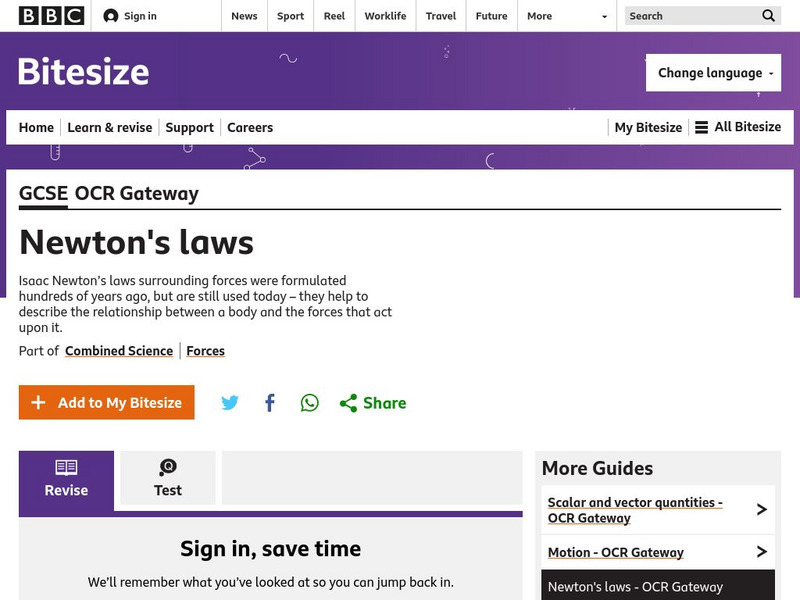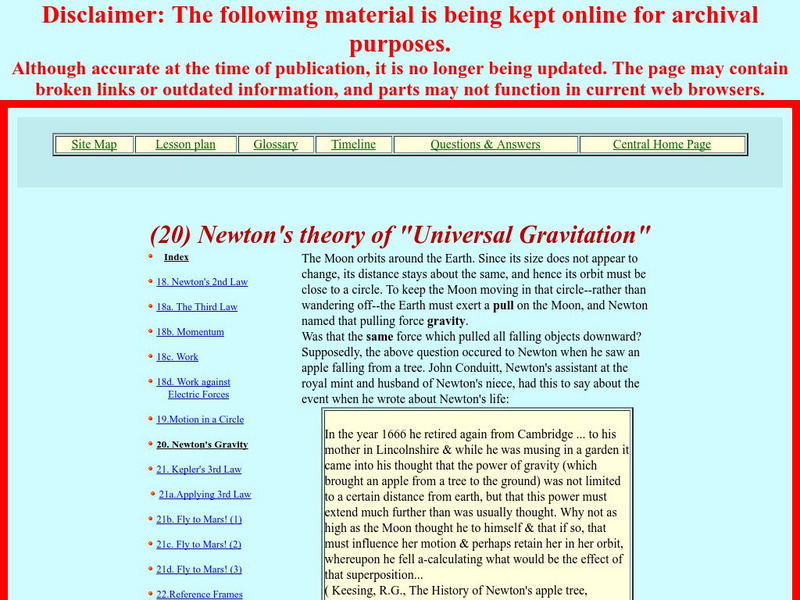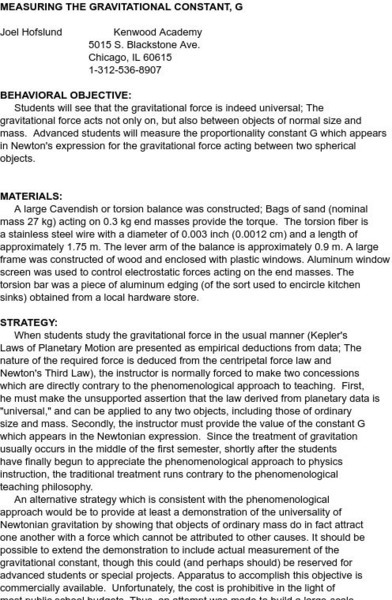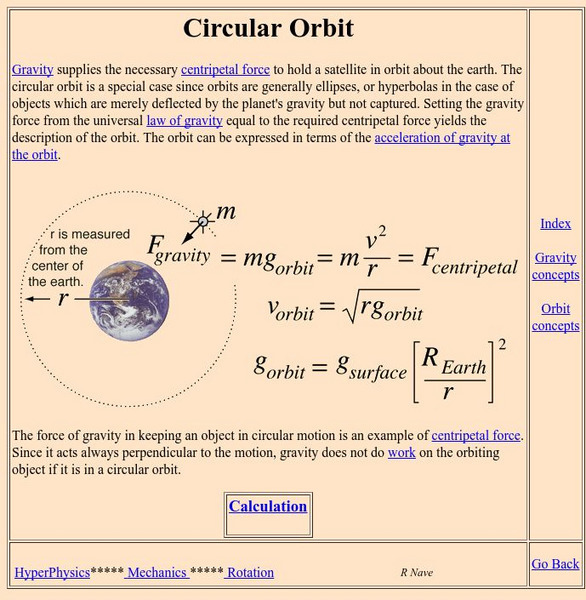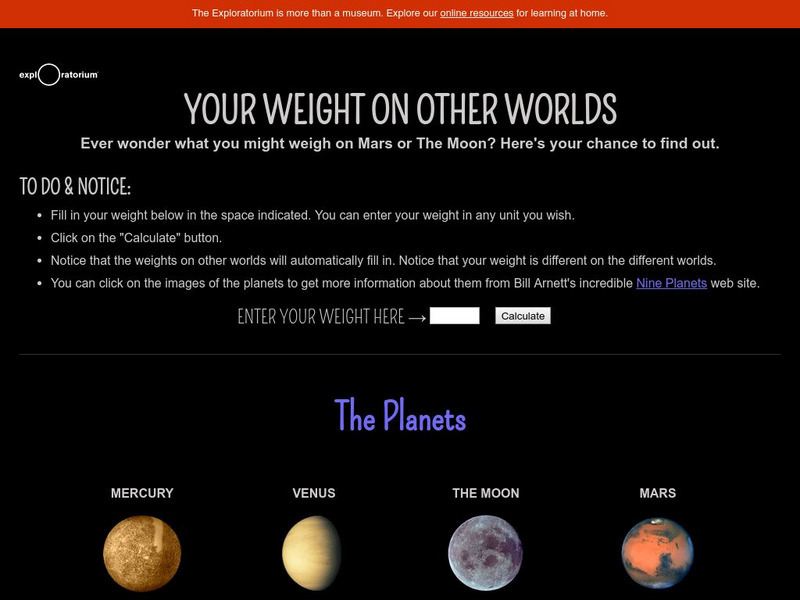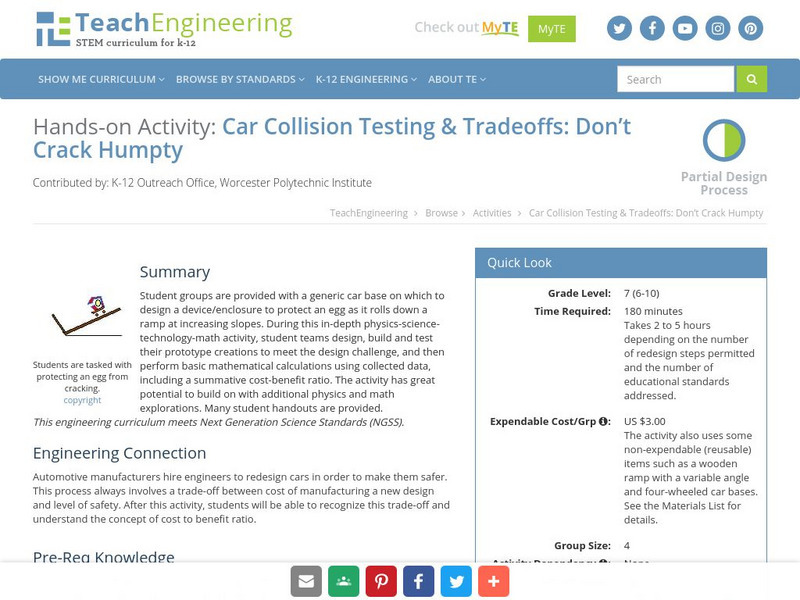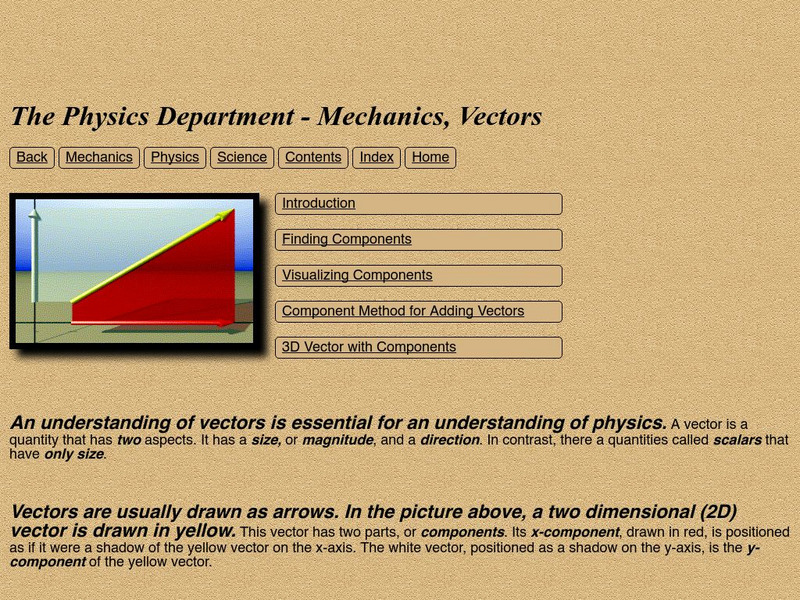Hi, what do you want to do?
Georgia Department of Education
Ga Virtual Learning: A Brief History of Astronomy
In this interactive module students will explore what different ancient cultures believe was an explanation of the stars and planets. They will look at how the work of Nicolas Copernicus revolutionize the world of astronomy and learn how...
Story Behind the Science
Story Behind the Science: Pendulum Motion, Time, and Shape of Earth [Pdf]
Article outlining the scientific history behind the evolution of theories about measuring time based on the movement of a pendulum, and about how gravity would impact a pendulum's movement depending on one's proximity to the Earth's...
Physics Classroom
The Physics Classroom: Newton's Laws: Elevator Ride Interactive
Have you ever felt that queasy feeling in a moving elevator? Explore the physics behind the sensations of weightlessness and weightiness. Teacher notes and a downloadable handout are also provided.
Science Bob Pflugfelder
Science Bob: The Lincoln High Dive
Instructions for a science demonstration of Newton's first law of motion using common supplies. Learn how to turn the demonstration into an experiment.
NASA
Nasa: Kepler and His Laws
This site from NASA provides biographical details about the lives of Tycho Brahe and Johannes Kepler. Discusses Kepler's successes at developing laws of planeatry motion. States the three laws and discusses each one individually....
Physics Classroom
The Physics Classroom: Kepler's Three Laws
The three laws of planetary motion as described by Kepler are stated and elaborated upon. Useful graphics and an easy-to-understand language are used to explain the nature of planetary motion. Both conceptual and mathematical. Includes a...
BBC
Bbc: Gcse Bitesize: Newton's Laws
This lesson focuses on Newton's Law for falling objects including terminal velocity, the three stages of falling, a diagram showing what happens to the speed of a skydiver from airplane to ground, velocity-time graphs for falling...
Wikimedia
Wikipedia: The Black Hole
This site examines the black hole as an object in astrophysics. Delve into this comprehensive resource that covers this concept from its history, to qualitative physics, the reality of black holes, mathematical physics and more.
Physics Classroom
The Physics Classroom: Satellite Motion
An animation depicting the path of projectiles launched at various launch speeds from the fictional Newton's Mountain. Accompanying text discusses satellite motion and the requirements of orbital motion. Links to further information is...
Science Struck
Science Struck: A Comprehensive List of All the Physics Formulas
Provides a long list of physics formulas for easy reference.
NASA
Nasa: Newton's Theory of "Universal Gravitation"
This site, which is provided for by NASA, discusses the thinking which led Newton to understand universal gravitation.
Science and Mathematics Initiative for Learning Enhancement (SMILE)
Smile: Measuring the Gravitational Constant, G
A demonstration/lab idea for determining the numerical value of the universal gravitation constant using a torsion balance.
Physics Classroom
The Physics Classroom: Kepler's Second Law
Kepler's second law of planetary motion is stated and explained. An animation of the orbit of a planet and an accompanying graphic assists in explaining the meaning of the law of equal areas.
Georgia State University
Georgia State University: Hyper Physics: Earth Orbits
An equation for the law of universal gravitation is stated. The weight equation (W=m*g) is related to the law. An interactive JavaScript form allows the user to practice determining the force of gravity and the acceleration of gravity...
CK-12 Foundation
Ck 12 Exploration Series: Simulations: Physics: Newton's Cannon
[Free Registration/Login Required] Learn about orbits and how an object can stay in orbit under the influence of gravity. By adjusting launch velocities users will understand how to successfully put a virtual satellite into orbit without...
Exploratorium
Exploratorium: Your Weight on Other Worlds
From the Exploratorium Museum. Includes an interactive feature in which a visitor enters their weight on earth and has their weight on other planets computed and displayed. Discusses the distinction between mass and weight and describes...
CK-12 Foundation
Ck 12: Kindergarten Science
[Free Registration/Login may be required to access all resource tools.] A science text for kindergarten that covers the weather and gravity.
CK-12 Foundation
Ck 12: Physics Simulation: Walk the Tightrope
[Free Registration/Login Required] Understand the concept of rotational inertia [moment of inertia) by analyzing the motion of a circus tightrope walker using this interactive simulation. A PDF worksheet and a video tutorial are also...
TeachEngineering
Teach Engineering: Car Collision Testing & Tradeoffs: Don't Crack Humpty
Student groups are provided with a generic car base on which to design a device/enclosure to protect an egg as it rolls down a ramp at increasing slopes. During this activity, student teams design, build and test their prototype...
NASA
Nasa: Vectors
This site from NASA provides an excellent tutorial on vectors and their use in physics to describe the motion of objects. Vector addition and resolution are illustrated.
Curated OER
Zona Land: Mechanics and Vectors
An exceptional tutorial on the topic of vectors that offers many helpful graphics, some of which are interactive.
CK-12 Foundation
Ck 12: Plix: Gravity in the Solar System
[Free Registration/Login Required] Test your knowledge of Newton's Law of Universal Gravitation with an animation and a short quiz.
Physics Aviary
Physics Aviary: Practice Problems: Universal Gravity Problem
Students must find out the strength of the gravitational force between two spherical objects based on the size, density and distance between centers.
Physics Aviary
Physics Aviary: Universal Gravity Lab
This lab was designed to allow students to collect data for the force between two objects in deep space. The students are transported by TARDIS to deep space and can use force probes to measure the pull between two objects. Students can...






![Story Behind the Science: Pendulum Motion, Time, and Shape of Earth [Pdf] Article Story Behind the Science: Pendulum Motion, Time, and Shape of Earth [Pdf] Article](https://static.lp.lexp.cloud/images/attachment_defaults/resource/large/FPO-knovation.png)

